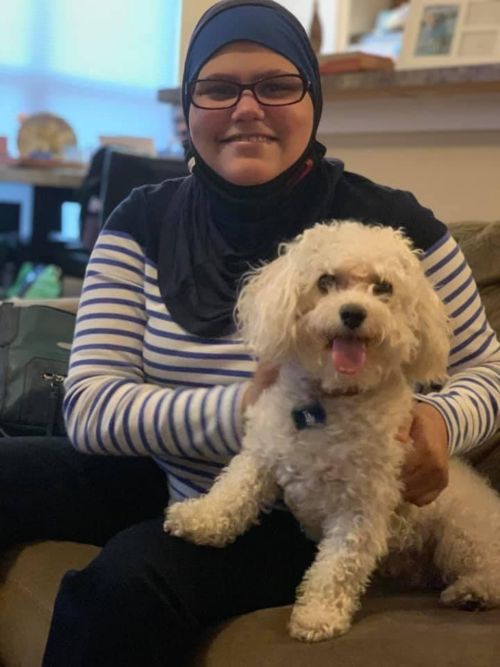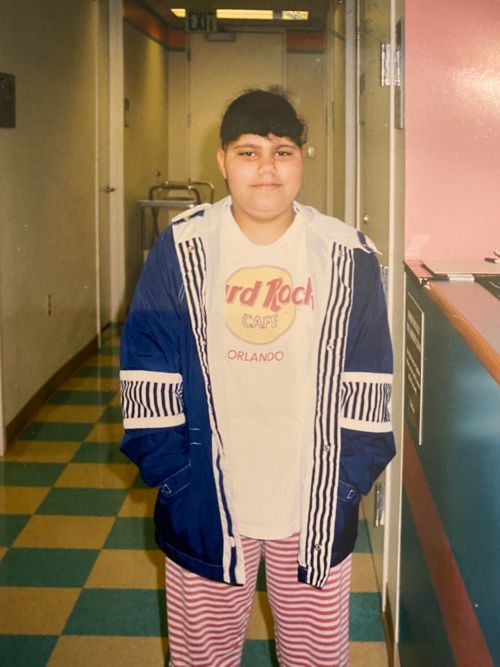When Nora was 8 years old, she was diagnosed with an inoperable brain tumor.
Find Support to Deal with Grief, Depression: Nora’s Story
When Nora was 8 years old, she was diagnosed with an inoperable brain tumor.

Nora in November 2020 with her sister's dog, Angel. Her sister Deena was inspired to go to medical school because of Nora's experience as a cancer patient.
Not long after her diagnosis, she met 2 other kids her age at Riley Children’s Hospital in Indianapolis who also had brain tumors. Their names were Sarah and Tyler. They all had the same doctor and tried to schedule chemotherapy appointments at about the same time during the week. To pass the time, they decided to form a club — the Brain Tumor Club. They played video games and kept each other company during chemotherapy.
The 3 members of the club had very different outcomes. Sarah’s tumor disappeared after 6 months of therapy. Nora had 18 months of chemotherapy. Her tumor came back 2 months later. She went to St. Jude Children’s Research Hospital in Memphis, Tenn., for experimental radiation treatment. She has been cancer-free ever since.
The third member of the club, Tyler, whom Nora had become very close to, didn’t make it.
“When he died, I was mad at him,” Nora, 32, said. “He left me. Why did he leave me? It’s not fair. I was only 9 years old. I didn’t understand.”
Nora still talks to Tyler’s mother. Questions linger. Nora asks herself: why did I survive when Tyler didn’t? She has lost many other friends to cancer. Three died on the same day. Each time, she asked herself those same questions. This survivor guilt has stayed with her all these years.
Survivor guilt is when you feel guilty after surviving an event that others did not. Not all cancer survivors will experience this feeling, but it’s not uncommon. If you are experiencing it, you are not alone.
“I still have problems processing, dealing with it,” Nora said. “I have a hard time dealing with changes -- having cancer and going through treatment, things change constantly. I personally don’t like change. I don’t like surprises. I don’t like the unknown.”
Looking back, Nora remembers feeling alone and unable to express her feelings. She felt like she had to keep her sadness bottled up. Others didn’t understand.

Nora at St. Jude Children's Research Hospital in 1999 for radiation treatment.
She needed a lifeline. She found it at age 16 when she went to a camp for cancer patients in Montana, Camp Mak-a-Dream.
“It wasn’t until then that I got out of deep depression,” Nora said. “The kids understood what I went through. They felt exactly how I felt and said I shouldn’t feel guilty. I thought I was going mad. I thought I was going insane.”
She still keeps up with friends she made there through email and Facebook. She also had great counselors. “They assured us that what we were feeling was normal and that we weren’t crazy.”
The connections she formed with others made the difference. Nora now knows it’s important to reach out to people who understand and who will listen.
“I felt like I was in a bubble and I couldn’t get out,” Nora said. “I had always been in a depressive state, but I know what to do now to get myself out. I open up to friends and counselors. It’s OK to open up.”
Nora teaches 4th grade in Indianapolis. She still has a tumor in her brain. It is between her pituitary and hypothalamus glands. She is experiencing late effects of her cancer treatment. She has to take hormones. She has permanent nerve pain. She is going through fertility treatments.
She married Aaron 4 years ago. They met in the first grade. He was the first friend who knew she had a brain tumor.
Nora finds meaning through her work as a schoolteacher. She teaches her students not to take every day for granted. We don’t know what might happen from one day to the next.
Grief over friends lost remains a part of Nora’s life, but she uses it as a catalyst to go on.
“You know you survived something and someone else didn’t even though they were under the same circumstances,” Nora said. “It felt shameful. I figured out that we do have the right to grieve and the right to feel guilty. Without grieving and feeling guilt, we won’t be able to move on.”
She keeps in contact with her friends. She writes her feelings in journal.
“If I talk to a childhood cancer survivor, they understand what I feel. They’ve been there. I don’t have to describe it.”
Nora advises others going through survivor guilt to reach out to support groups for childhood cancer patients and survivors. It helps to connect with others who have been there. They understand your experience. It’s easier to open up.
“It’s a comfort to express how I feel and realize that someone else understands,” Nora said.
Nick discusses how he views surviving as an opportunity to thrive thanks to inspiration from his friend who passed away.
—
Posted: December 2020